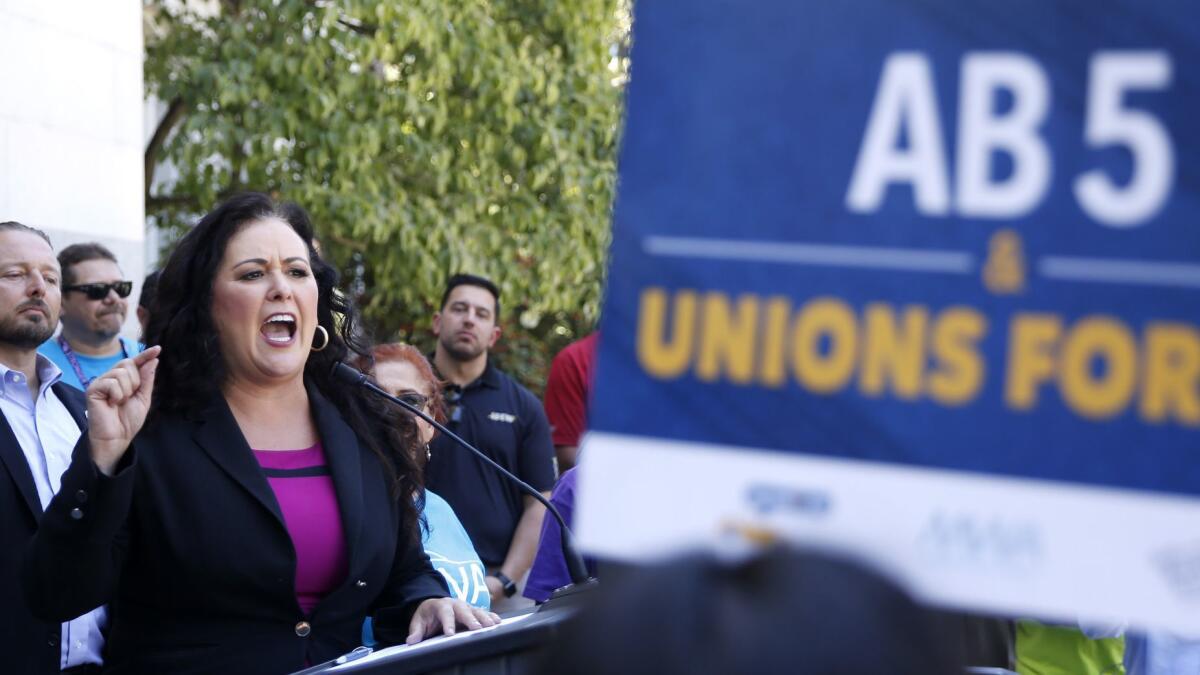Sweeping bill rewriting California employment law sent to Gov. Newsom

SACRAMENTO — California lawmakers rewrote the rules of employment across a wide swath of industries Wednesday in legislation that could grant hundreds of thousands of workers new job benefits and pay guarantees.
After vigorous debates over what occupations should be exempted, Assembly Bill 5, which curbs businesses’ use of independent contractors, gained final approval in the state Senate and the Assembly and was sent to Gov. Gavin Newsom, who has pledged his support.
The 6,700-word bill is one of the most controversial of the year. It could upend the relationship between workers and bosses across businesses as varied as ride-hailing tech giants, construction, healthcare, trucking, janitorial services, nail salons, adult entertainment, commercial fishing and newspapers.
The message of the legislation, said its author, Assemblywoman Lorena Gonzalez (D-San Diego), is “we will not in good conscience allow free-riding businesses to continue to pass their own business costs on to taxpayers and workers. It’s our job to look out for working men and women, not Wall Street and their get-rich-quick IPOs.”
Contractors, including many in multibillion-dollar technology companies, are not covered by laws guaranteeing a minimum wage, overtime pay, sick leave, family leave, unemployment and disability insurance, workers’ compensation and protection against discrimination or sexual harassment. Nor do businesses pay into Social Security or Medicare for contractors.
When Kristyn Hansen first took a job at Stews Barber Shop, she cut hair nine hours a day, three days a week.
After months of lobbying by the California Chamber of Commerce and a score of trade associations, AB 5 exempted a host of occupations — but not platform-based gig giants Uber, Lyft, DoorDash, Postmates and others that mounted a powerful push to avoid reclassifying their workers as employees with labor law protections.
The bill passed the Assembly 56 to 15 and the Senate 29 to 11 along largely partisan lines, with most Democrats voting in favor and most Republicans opposed. But lawmakers of both political stripes raised concerns about how it could negatively affect businesses in their districts.
“California used to be a place where the entrepreneurial spirit was nurtured,” said Assemblyman Jay Obernolte (R-Big Bear Lake), who voted against the bill. “If this is the thinking of the Legislature and this is the thinking of our governor, I really fear for the future of our state.”
AB 5 codifies and expands on a 2018 California Supreme Court decision that adopted a strict, three-part standard for determining whether workers should be treated as employees, modeled on a Massachusetts test. Without the bill, the court decision would have affected a far broader share of the economy.
Other states have adopted rules to extend benefits such as unemployment insurance and workers’ comp to independent contractors. But California’s bill is arguably the strongest in the nation. It gives the state and cities the right to file suit against companies over misclassification, overriding the arbitration agreements that many businesses use to shield themselves from worker complaints.
California is likely to set a precedent for others and could offer impetus for similar legislation now pending in Congress. Several Democratic presidential candidates endorsed AB 5.
However, enforcing the law against multibillion-dollar app-based technology behemoths, with a California workforce estimated at some 400,000 full- and part-timers, could involve protracted battles.
Uber, Lyft and DoorDash last week funneled $90 million into a committee for a ballot initiative that would create a separate category under the labor code for their workers, unless the Legislature meets their demands in its next session. And Uber signaled Wednesday that it would continue to resist efforts to turn drivers into employees.
“Drivers will not be automatically reclassified as employees, even after January of next year,” Tony West, Uber’s chief legal officer, told reporters after the vote. “We expect we will continue to respond to claims of misclassification in arbitration and in court as necessary, just as we do now.”
Thousands of Uber, Lyft and DoorDash workers have filed misclassification lawsuits and mounted public protests over slashed wages and arbitrary terminations. Others, however, fear that employee status would encourage the companies to curtail their hours and prevent them from driving on multiple platforms.
Newsom has signaled his interest in finding a compromise that would satisfy both the tech companies and labor unions that have set their sights on organizing tech workers.
But in a Labor Day opinion article, he offered a strong endorsement of AB 5. He noted that misclassified workers “lose basic protections like the minimum wage, paid sick days and health insurance benefits. Employers shirk responsibility for safety net programs like workers’ compensation and unemployment insurance. Taxpayers are left to foot the bill.”
State officials estimate California loses some $7 billion a year in payroll taxes because of misclassification. Food stamps, medical care and other safety net benefits for independent contractors who do not earn a living wage from their gigs add to the tally.
AB 5 was pushed by a powerful coalition of labor unions, many of which have suffered stagnating membership as companies classify large chunks of their workforces as independent contractors. Under federal law, only employees can join unions and collectively bargain for wages and benefits.
In one letter to lawmakers, California building trades unions, representing 450,000 Teamsters, roofers, painters, boilermakers and other workers, called construction “the original gig economy,” noting, “our employers face intense competition from the underground economy … unscrupulous contractors that win bids by misclassifying workers.”
Besides the vociferous tech company lobbying, other businesses besieged lawmakers over months. Trucking associations filed suits over rules laid out in the court decision and fleets of independent owner-operators circled the Capitol in their big rigs, horns blaring. The legislation was amended to offer a narrow carve-out to independent owner-operators delivering to construction sites.
Newspapers posted editorials seeking exemptions for part-time delivery workers and the California News Publishers Assn. ran full-page ads asserting that AB 5 would put many newspapers out of business. In the end, the group was promised a one-year reprieve from enforcement.
The court decision that led to AB 5 involved a package-delivery business, Dynamex Operations West. The company reclassified its employees as independent contractors, slashing their benefits and forcing them to use their own vehicles.
Under the court’s new test, a worker is an employee if his or her job forms part of a company’s core business; if the bosses direct the way the work is done; or if the worker has not established an independent trade or business.
The new “ABC test,” as it is called, replaces an 11-point standard set in a 1989 court case that “made determining who was or was not an independent contractor complicated, expensive, and prone to litigation,” according to the state Senate analysis of AB 5.
The Dynamex decision applied only to rules governing minimum wages, overtime and meal and rest breaks, but under AB 5 workers classified as employees must also be afforded workers’ compensation in the event of an industrial injury, unemployment and disability insurance, paid sick days and family leave.
Businesses say the extra benefits add as much as 30% to their labor costs.
But AB 5 is narrower than the court decision due to the scores of occupations it exempts from the new test. Exempted workers include doctors, dentists, lawyers, engineers, accountants, architects, Realtors, travel agents, graphic designers, human resources administrators, grant writers, marketers, fine artists, investment advisors and broker-dealers.
Several exemptions come with conditions. Commercial fishermen are exempt except from unemployment insurance. Barbers, cosmetologists and manicurists are exempt only if they set their own rates, are paid directly by clients and schedule their own appointments. Salespersons are exempt, provided their pay is based on actual sales, rather than wholesale purchases or referrals.
The exemptions raised objections even among the bill’s opponents. The carve-outs favored “the trade groups with the best lobbyists,” said Assemblywoman Marie Waldron (R-Escondido).
More to Read
Inside the business of entertainment
The Wide Shot brings you news, analysis and insights on everything from streaming wars to production — and what it all means for the future.
You may occasionally receive promotional content from the Los Angeles Times.














